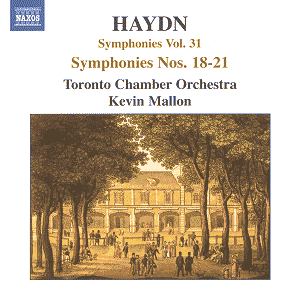I suspect that most
would probably not place any of these
works in, say, the ‘top’ 40 of Haydn’s
symphonies. I don’t say this to denigrate
them, or to suggest that they are not
worth hearing. Far from it, they are
very much worth hearing – the fact that,
interesting as they are, they do not
hold a prominent place amongst Haydn’s
symphonies is merely very eloquent testimony
as to just how remarkable their composer’s
work in this evolving genre was.
Nos. 18-20 seem to
have been written, between 1758 and
1761, for the small orchestra of Count
von Morzin, to be performed either at
the family castle in Bohemia, where
the summers were spent, or at the Count’s
winter residence in Vienna. Count von
Morzin employed - until he hit serious
financial problems – both a small string
orchestra and a wind band. Haydn was
able to draw on musicians from both.
From 1761 Haydn was in the employment
of Prince Paul Anton Esterházy,
first as Vice-Kapellmeister and then
as Kapellmeister proper. Symphony No.21
belongs to the first few years of Haydn’s
Esterházy years. Some scholars
suggest 1764 as the date of composition;
others put it as early as 1761.
All four of these symphonies
– the earliest written when Haydn was
in his late twenties – show us Haydn
experimenting with the possibilities
of this ‘new’ form, drawing on materials
such as the sonata da chiesa,
the Italian overture and the work of
the early Mannheim symphonists. No.18
has the opening slow movement familiar
from the sonata da chiesa, and
the dotted rhythms of that movement
give it a somewhat old-fashioned air;
the ensuing allegro, however,
in its impressive rhythmic drive is
more ‘modern’; Haydn’s own ‘voice’ is
very recognisable here. No.19, like
No.18 is in three movements, but this
time the first movement is an allegro
in triple time, full of energy.
The andante which follows, for strings
alone, has a graceful minor-key melancholy
and the very fine closing presto
has a kind of forceful self-confidence.
No. 20 is in four movements, and in
its sequence of allegro molto – andante
cantabile – menuet – presto it comes
closest to the pattern we are familiar
with in the later symphonies. The trumpets,
horns and timpani employed in all but
the andante give a ceremonially
festive air to much of the music; in
the slow movement for strings alone,
the presentation of the opening theme,
played by first and second violin above
the pizzicato of the other strings,
is strikingly beautiful. No. 21, makes
subtle use of the wind instruments,
not least in the writing for the oboes
in the first movement, a lyrical and
expressive adagio again reminiscent
of the traditions of the sonata da
chiesa. Interestingly, the first
eight notes of the menuet were ‘borrowed’
(how consciously?) by Mozart in Eine
kliene Nachtmusik.
It will be seen, then,
that each of these four symphonies is
significantly different – in such matters
as instrumentation, in number and sequence
of movements – from its fellows. It
makes for an entertainingly varied disc,
on which the Toronto Chamber Orchestra
(previously called the Toronto Camerata
on, for example, Naxos 8.557656) plays
with crispness and clarity, as well
as appropriate warmth, under the direction
of Kevin Mallon. If you are collecting
the ongoing Naxos set of Haydn’s symphonies,
played by various orchestras, or if
you simply want a disc of Haydn’s early
work in the genre, this should satisfy
most listeners.
Glyn Pursglove


